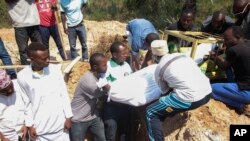Burundi’s controversial presidential election has been postponed until July 21 amid escalating violence there.
Soldiers and unidentified gunmen clashed recently in Kayanza province, near the border with Rwanda. The governor there said the gunmen had crossed from Rwanda, a charge denied by Rwandan leaders, but which could fan fears that the political infighting and street protests against President Pierre Nkrunziza running for re-election could escalate into a wider conflict.
Burundi’s opposition is boycotting the election, saying that Nkrunziza’s decision to seek a third term is unconstitutional. The announcement of his re-election bid in April triggered weeks of demonstrations, some deadly. The president cites a court ruling saying he can run again.
Presidential spokesman Gervais Abayeho said Nkrunziza signed a decree postponing the voting, once scheduled for July 15, in response to a request from the leaders of the East African Community partner states. The African nations had sought a delay until July 30 to give Ugandan President Yoweri Museveni time to try to mediate a dialogue between President Nkrunziza and the opposing groups, in effort to restore peace and security. Abayeho said such a delay “would be beyond constitutional limits.”
The United States is deeply concerned by reports that fighting has broken out in several areas of Burundi and by recently broadcast remarks by Burundians threatening to use force against their government.
We urge all parties there to commit themselves to constructive dialogue to resolve peacefully the political impasse that threatens to unravel the peace and stability ushered in by the implementation of the Arusha Agreement over a decade ago. The United States condemns violence as a means to attain political goals, and opposes any attempt to seize power through extraconstitutional means. We strongly oppose any armed activity or incursions into Burundi and will seek to hold accountable those responsible for gross human rights abuses.






